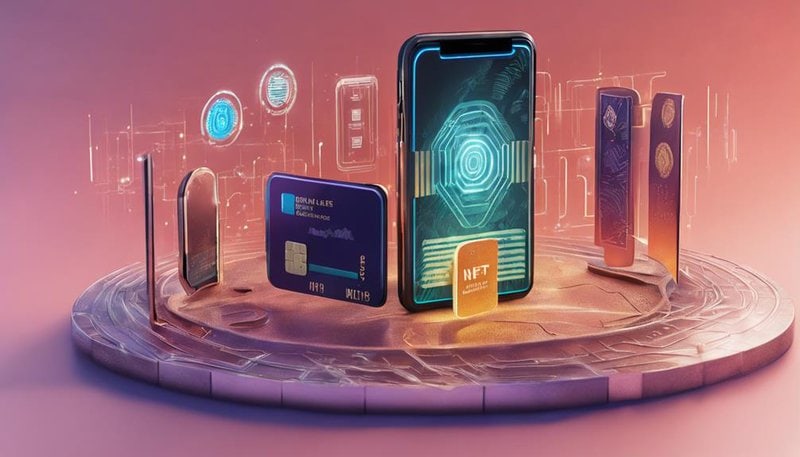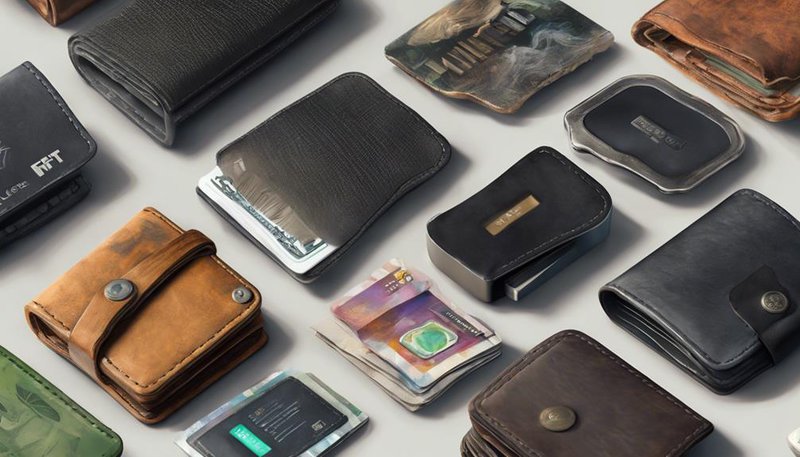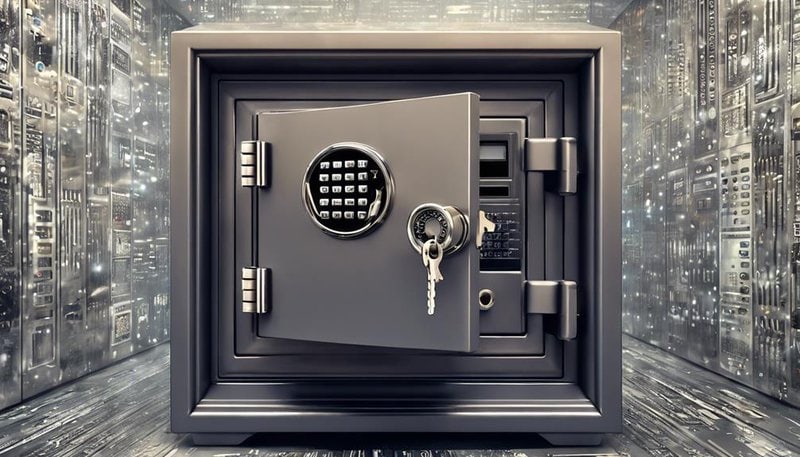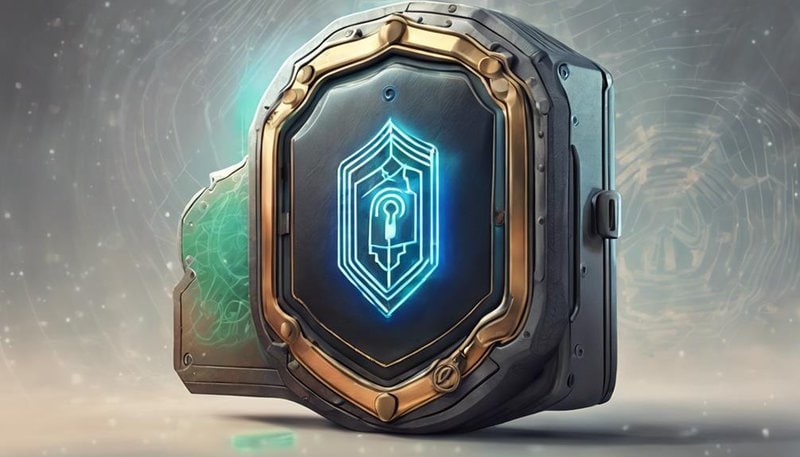What Are NFT Wallets? Securely Storing Your Digital Assets

NFT wallets serve as digital wallets specifically designed to store and manage non-fungible tokens securely. These wallets use encryption technology to ensure the safety and integrity of your NFTs.
By storing your NFTs in a dedicated wallet, you retain full control over your digital assets and can access them whenever needed. This level of security is crucial in the world of digital assets, where threats such as hacking and theft are prevalent.
Key Takeaways
- NFT wallets safeguard digital assets with encryption technology.
- They provide full control over assets in a secure blockchain environment.
- Prioritizing security protects valuable assets from cyber threats.
- Understanding digital asset protection is vital in the online world.
Understanding NFT Wallets
To truly grasp the essence of NFT wallets, delve into the core principles that underpin their secure storage capabilities. NFT wallet functionality extends beyond mere storage; it encompasses a sophisticated system designed to safeguard your digital assets with precision and care. These wallets provide secure storage solutions by utilizing blockchain technology to create a tamper-proof environment where your NFTs are stored and accessed.
When exploring NFT wallet functionality, it's crucial to understand that these wallets operate on both the blockchain and off-chain. The blockchain ensures transparency and immutability, while off-chain storage enhances accessibility and usability. This dual-layered approach guarantees that your digital assets remain secure while offering convenience in managing them.
In essence, NFT wallets aren't just digital containers but sophisticated guardians of your valuable assets. By embracing the core principles of security and innovation, these wallets provide a reliable and efficient means of storing and managing your NFTs. Embrace the power of NFT wallets, knowing that your digital assets are in safe hands.
Importance of Digital Asset Security
In safeguarding your digital assets, prioritizing security is paramount to ensure their protection against potential threats. Cybersecurity threats loom large in the digital world, making it crucial to take proactive measures to safeguard your valuable assets. By understanding the importance of digital asset protection, you can better navigate the complex landscape of online security.
To emphasize the significance of digital asset security, consider the following table:
| Importance of Digital Asset Security |
|---|
| Safeguards against cyber threats |
| Ensures protection of valuable assets |
| Provides peace of mind for asset holders |
Types of NFT Wallets

When exploring the realm of NFT wallets, delving into the diverse array of options available can illuminate the path towards securing your digital assets effectively. Understanding the types of NFT wallets, such as hardware wallets and software wallets, is crucial in safeguarding your valuable digital possessions.
Hardware wallets, known for their robust security features, are physical devices designed to store your NFTs offline, making them less susceptible to hacking. These wallets are considered a form of cold storage, keeping your assets completely offline when not in use.
On the other hand, software wallets are digital applications or online services that provide a convenient way to access your NFTs. While software wallets are more accessible for frequent trading due to their online nature, they're considered hot storage, making them potentially more vulnerable to cyber threats.
Choosing between hardware and software wallets depends on your preferences and security needs. Selecting the right type of NFT wallet is essential in ensuring the safety of your digital assets.
Setting Up Your NFT Wallet
As you begin setting up your NFT wallet, it's crucial to consider wallet selection tips that align with your needs.
Understanding the security measures required to safeguard your digital assets is paramount in this process.
Additionally, having a solid backup and recovery plan in place will ensure the protection and accessibility of your NFTs in any situation.
Wallet Selection Tips
Consider your NFT wallet as the digital vault safeguarding your valuable assets in the virtual realm. When selecting an NFT wallet, keep in mind the following tips:
- Research different wallets to understand their security features and reputation.
- Evaluate the wallet's compatibility with the type of NFTs you own.
- Look into the encryption methods utilized by the wallet for secure storage.
- Consider the user interface and ease of use for managing your digital assets.
- Take into account the wallet's customer support availability for any assistance needed.
Security Measures Overview
For a robust safeguard of your digital assets, prioritize implementing stringent security measures when setting up your NFT wallet. Ensuring secure storage and digital protection is paramount in the world of non-fungible tokens. To enhance the security of your NFT wallet, consider the following measures:
| Security Measures | Description |
|---|---|
| Strong Passwords | Use complex, unique passwords |
| Two-Factor Authentication | Add an extra layer of security |
| Encryption | Encrypt your wallet for added protection |
| Regular Updates | Keep your wallet software up to date |
Backup and Recovery
Safeguard your digital assets effectively by prioritizing the setup of your NFT wallet with a strong focus on backup and recovery procedures. To ensure the security of your NFTs, consider the following key points:
- Backup strategies
- Regularly backup your wallet files on external storage.
- Implement a secure cloud backup solution for redundancy.
- Recovery options
- Store your seed phrase offline in a secure location.
- Familiarize yourself with the recovery process of your wallet provider.
- Consider using a hardware wallet for added security.
Key Features to Look For
When selecting an NFT wallet, prioritize security features to safeguard your digital assets.
Look for a user-friendly interface design that simplifies the management of your NFTs.
These key features ensure a seamless and protected experience in storing your valuable digital assets.
Security Features Overview
Ensure the protection of your digital assets by selecting an NFT wallet with robust security features. When choosing an NFT wallet, prioritize these key security elements:
- End-to-End Encryption: Look for wallets that employ strong encryption methods to safeguard your data from unauthorized access.
- Biometric Authentication: Opt for wallets that offer biometric authentication (fingerprint, facial recognition) for an extra layer of security.
- Multi-Signature Support: Choose wallets that support multi-signature transactions to prevent unauthorized transfers.
- Secure Backup Options: Select wallets that allow for secure backup and recovery processes to ensure access to your assets in case of emergencies.
- Decentralized Storage: Consider wallets that utilize decentralized storage solutions to reduce the risk of centralized hacking.
User-Friendly Interface Design
Prioritize NFT wallets that feature an intuitive user interface design, offering key features that enhance your overall interaction with your digital assets. When selecting an NFT wallet, consider aspects such as user experience and accessibility. Look for wallets that allow for interface customization to suit your preferences. A user-friendly design can make managing your digital assets a seamless experience. Here are key features to look for in an NFT wallet interface:
| Key Features | Description | Importance |
|---|---|---|
| Intuitive Navigation | Easy-to-use menus and clear pathways | High |
| Customizable Themes | Personalize the interface to your liking | Medium |
| Quick Access Buttons | Convenient shortcuts for common actions | High |
Securing Your Private Keys

To safeguard your digital assets effectively, securing your private keys is paramount in the realm of NFT wallets. Your private keys are the gateway to your digital treasures, and protecting them should be your top priority.
Here are five essential tips to help you secure your private keys and keep your funds safe:
- Never Share Your Private Keys: Your private keys are meant for your eyes only. Sharing them with anyone compromises the security of your assets.
- Use Hardware Wallets: Consider using hardware wallets for an added layer of security. These physical devices store your private keys offline, making them less vulnerable to online threats.
- Enable Two-Factor Authentication: Adding an extra layer of security through two-factor authentication can prevent unauthorized access to your wallet.
- Regularly Update Your Wallet Software: Stay vigilant and ensure your wallet software is always up to date to benefit from the latest security features.
- Backup Your Private Keys Securely: Make multiple backups of your private keys and store them in secure, offline locations to prevent loss or theft.
Backup and Recovery Methods
Consider implementing a robust backup strategy to safeguard your digital assets in case of unforeseen circumstances. Backup options are crucial to ensure that you can recover your NFTs even if your primary storage fails. One effective method is to regularly back up your NFT wallet's private keys and seed phrases on offline devices like USB drives or paper wallets. This offline storage minimizes the risk of cyber theft.
Data encryption adds another layer of security to your backups. Encrypting your backup files or drives with strong passwords or encryption software helps prevent unauthorized access to your sensitive information. Remember to store your backup devices in secure locations, separate from your primary storage, to reduce the risk of simultaneous loss.
Regularly test your backup and recovery process to ensure its effectiveness. By following these backup and recovery methods diligently, you can enhance the security of your digital assets and protect them from potential data loss incidents.
NFT Wallet Security Best Practices

To safeguard your NFT assets, ensure you employ strong password protection and activate two-factor authentication. These fundamental security practices add layers of defense to your NFT wallet, making it more resilient against potential threats.
Strong Password Protection
For safeguarding your NFT wallet, implementing a robust password protection strategy is paramount. To ensure the security of your digital assets, consider the following best practices:
- Password Complexity: Create a password that includes a mix of uppercase and lowercase letters, numbers, and special characters.
- Biometric Authentication: Utilize biometric features like fingerprint or facial recognition for an additional layer of security.
- Avoid Common Passwords: Steer clear of easily guessable passwords like '123456' or 'password.'
- Regularly Update Passwords: Change your passwords periodically to reduce the risk of unauthorized access.
- Use a Password Manager: Consider using a reputable password manager to securely store and manage your login credentials.
Two-Factor Authentication
Implementing Two-Factor Authentication is a crucial step in fortifying the security of your NFT wallet, adding an extra layer of protection beyond just your password.
By enabling this feature, you're enhancing the safeguarding of your valuable digital assets. Two-Factor Authentication can take various forms, including biometric authentication like fingerprint or facial recognition, which adds a personalized security measure.
Moreover, it offers multi-device support, allowing you to access your NFT wallet securely from different gadgets. This method significantly reduces the risk of unauthorized access.
Additionally, Two-Factor Authentication contributes to enhancing hardware security, ensuring that only authorized users can access your NFT wallet.
Integrating Wallets With NFT Marketplaces
Integrating your NFT wallet seamlessly with various NFT marketplaces is crucial for effective management of your digital assets. Ensuring a smooth connection between your wallet and the marketplaces where you buy, sell, and trade NFTs streamlines the process and enhances security. Here are five key aspects to consider in integrating your wallet with NFT marketplaces:
- Compatibility: Check that your wallet is compatible with the marketplace you intend to use.
- Security Features: Look for marketplaces that offer secure integration options to safeguard your assets.
- User Experience: Choose platforms that offer a user-friendly interface for easy wallet integration.
- Transaction Speed: Opt for marketplaces that provide quick and efficient transactions when using your wallet.
- Support: Select marketplaces with reliable customer support to assist with any wallet integration issues.
Future Trends in NFT Wallet Development

Seamlessly adapting to the evolving landscape of NFT technology, the future of NFT wallet development promises innovative features and enhanced security measures. As the NFT ecosystem continues to expand, two key trends in NFT wallet development will shape the way users interact with their digital assets: wallet interoperability and blockchain integration.
Here is a table highlighting these future trends:
| Future Trends in NFT Wallet Development |
|---|
| 1. Wallet Interoperability |
| Ensuring that NFT wallets can seamlessly interact with various NFT marketplaces and platforms, allowing for greater flexibility and convenience for users. |
| 2. Blockchain Integration |
| Integrating NFT wallets more closely with specific blockchains, enhancing security, and enabling more efficient transactions and interactions within the blockchain network. |
| 3. Enhanced Security Measures |
| Implementing advanced security protocols such as multi-factor authentication and biometric verification to safeguard users' valuable digital assets. |
Frequently Asked Questions
Can NFT Wallets Be Hacked or Compromised?
To keep your NFTs safe, take heed. Security measures are vital, but vulnerabilities exist. Strengthen defenses to ward off hacks. Embrace risk mitigation strategies and adopt best practices to safeguard your digital treasures.
Are NFT Wallets Insured Against Theft or Loss?
When it comes to NFT wallets, insurance coverage is not typically offered. To prevent loss, you must secure your digital assets through best practices like using hardware wallets and backing up your private keys.
How Do NFT Wallets Handle Compatibility With Different Blockchain Networks?
To ensure seamless cross chain interoperability, NFT wallets implement robust security measures and optimize wallet integration for various blockchain networks. This ensures compatibility and efficient management of your digital assets across different platforms.
Can NFT Wallets Store Other Types of Digital Assets Besides NFTs?
Yes, NFT wallets can store various digital assets, enhancing interoperability and cryptocurrency integration. By supporting multiple tokens, these wallets provide a secure and versatile solution for managing your diverse digital holdings efficiently.
Are There Any Regulations or Legal Considerations to Keep in Mind When Using NFT Wallets?
When using NFT wallets, always prioritize regulatory compliance to avoid legal implications. Stay informed about laws governing digital assets. Protect yourself by understanding the rules and ensuring your actions align with legal requirements.










